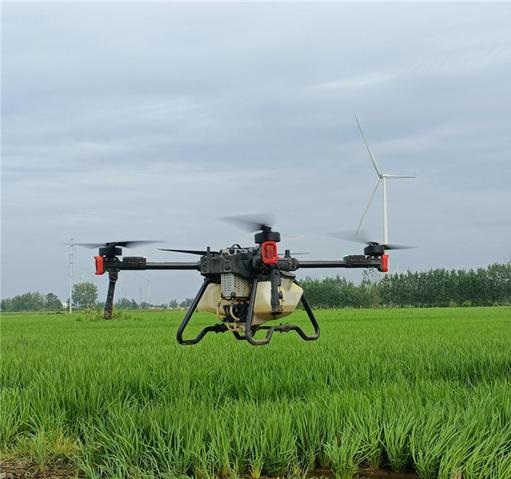
Blue sky and white clouds, the wind blows the rice fields. Now it is the critical period of “one spray and three prevention” for the prevention and control of rice pests and diseases. In the 10,000-mu standard farmland in Weiji Town, Suining County, Xuzhou City, a group of pilots are operating plant protection drones, looking up at the sky, and using the equipment in their hands to easily command the plant protection drones to spray drugs. idyllic scenery. With the advancement of modern agricultural equipment technology, plant protection drones have now quietly entered the rural fields, helping the “acceleration” of agricultural production, and inserting “golden wings” for the development of modern agriculture. When she met Li Xinling, a new farmer
born in the 1980s in Weiji Town, she was busy operating a plant protection drone to spray the rice fields. I saw her and her husband Li Ya unload the tens of kilograms of plant protection drones from the truck, put them on the edge of the field, add pesticides to the spreading system, turn on the handheld devices, set parameters, plan the route, and put their fingers on the screen. After clicking to start, a quad-rotor drone quickly turned the propeller, and with a “huo” sound, it rose from the ground, and flew quickly into the sky over the rice field according to the set route, and the pesticide was sprayed down evenly and accurately. Since Li Xinling became a pilot, she has lost count of how many takeoffs and landings she has operated. “Learning to fly a drone is still enough of the pain of carrying medicine buckets to fight medicine.” Li Xinling said. In 2018, Li Xinling and her husband Li Ya returned from Shanghai to start a business and contracted 60 mu of land to grow rice. In the unbearable heat of the rice fields, she and her husband each carried
a medicine bucket weighing dozens of catties to spray pesticides. They carried more than a dozen buckets of medicine in the afternoon, and only occupied less than 20 acres of land. “Occasionally, we heard that the big grain growers nearby brought drones to spray medicine from outside, and they could finish 20 acres of land in 5 minutes.” Li Xinling said that after seeing the magic of drones, she was keenly aware that this was a very promising industry and she decided to buy a drone. Just do what you say, buy a drone, the first step is to get an operating certificate. Li Xinling participated in the drone operation training held by the county and became the first female “pilot” of plant protection drones in Suining. After Li Xinling got the operation qualification certificate, at the end of 2018, she spent nearly 80,000 yuan to buy a DJI plant protection machine with the help of the town government. “Compared with manual pesticide spraying, drones produce uniform and fine fog, good spraying effect, and high farming efficiency. The most important thing is that you no longer have to worry about labor difficulties when farming is busy, and it is much more convenient to go into battle by yourself!” Li Xinling said, During the busy farming season, farmers need to queue up to reserve drone plant protection operations, and the average daily net income of each aircraft reaches more than 2,000 yuan. In modern agricultural production, the addition of high-tech machinery makes farming simple. Han Lu, a “post-80s” student from Zhangji Community, Weiji Town, returned to his hometown to start a business. He learned drone driving technology at his own expense. He took over the family farm of his father, Han Binghua, and planted more than 1,400 acres of land. The farm purchased 4 drones and 7 rice transplanters. While planting and managing his own fields, he provides plant protection trusteeship services for surrounding farmers. The annual plant protection trusteeship service is 50,000 mu times, and the annual income is more than 400,000 yuan. Liu Yang, a returning college student from Xialou Village, Weiji Town, contracted and operated more than 100 mu of land to set up a family farm, and purchased two plant protection drones to provide plant protection and fertilizer distribution services to surrounding farmers, with an annual service area of 15,000 mu. “In recent years, the rural plant protection drone market has been getting better and better, more and more young people have become professional pilots, and more and more farmers have begun to accept this new method of farmland trusteeship plant protection.” Liu Rui, the person in charge of the handling, introduced. Today, young backbones and outstanding rural youth models like Li Xinling, Han Lu, and Liu Yang who have returned to their hometowns to start their own businesses have become a microcosm of the rural revitalization of Weiji Town. In recent years, Weiji Town has vigorously implemented the “Three Townships Project” to encourage and guide the whole society to participate in promoting entrepreneurship, stimulating employment, and thriving industries, and accelerating the promotion of drones, side-depth fertilizer spreaders, fertilizer simulcasters, rice transplanters and harvesters, etc. New agricultural machinery and tools are used in agricultural production, and play the role of young talents in improving agricultural production efficiency, saving production costs, and transforming agricultural production methods. They are sweating, full of confidence, and writing their own dream of rural revitalization in the new era. Meng Xiang, deputy secretary of the Party Committee and mayor of Weiji Town, Suining County, said: “In the next step, we will carry out in-depth services for returning to the countryside to start a business, focus on cultivating and recommending rural youth backbones, and continue to promote the integration and upgrading of new agricultural technologies and new machinery to promote modernization. The efficient, automated and green development of agricultural production will ensure the food security of the town, and let the drones for plant protection fly to help the revitalization of the ‘flying’ countryside.”






Please sign in to comment
register